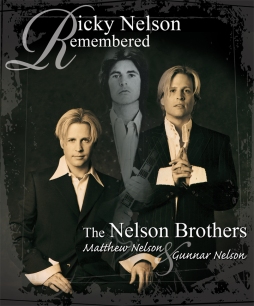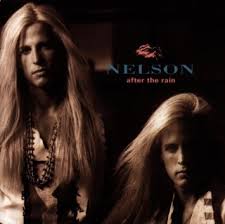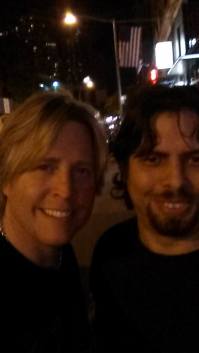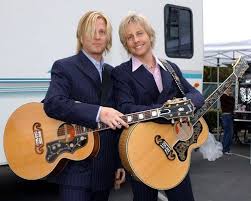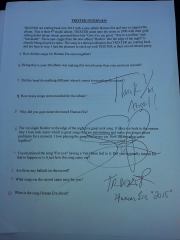NELSON released their debut album After the rain. Releasing four singles hit singles. (Can’t Live without your love) and affection which went straight to #1, After the rain, more than ever, and time will tell all made the top 40 billboard charts. After 26 years NELSON are alive and rocking with no signs of slowing down. There is a lot on the horizon with NELSON with no signs of slowing down. NELSON continues to get better with time. NELSON are touring the rest of the year as Ricky Nelson Remembered playing the songs from Ricky Nelson. I was able to talk to Matthew Nelson about Nelson’s debut album after the rain and his career all the way up until what he has been up to lately.
Angel Alamo: Who came up with the name “After the Rain”?
Matthew Nelson: Gunner and I came up with it jointly. We just thought that it was autobiographical. We had been through a fairly rough go of it, believe it or not. The first thing that somebody would think is, “oh they came from a famous family. They had it easy.” It was kind of the opposite. Honestly, we had each other, we had music. We loved our dad, but he was gone three hundred days a year, minimum, and touring. And our mother didn’t have the mother gene, so for us it was a dream of making music and stuff. In hindsight we had been working in clubs in LA since we were twelve, and it took us almost a decade to get our first album signed, paid, released, all that kind of stuff. I got to see all my buddies get signed before us. That’s why we called it “After the Rain.” By the time it was done it was cathartic, and a culmination of years and years of writing and making it happen.
Angel Alamo”Can’t Live Without Your Love” is a famous song about having a crush on Cindy Crawford. Did you guys ever get to meet Cindy Crawford, and how did she feel about the song.
Matthew Nelson: Yeah I did at the MTV Rock ‘N Jock softball game the year after it was a big hit. The song went to number one on the Billboard Pop Charts, and she was fine. It was just really one of things a story that got out of hand. We spoke a couple times. She was a gracious person, but that was about it. She was thrilled. She said to my brother, “what do you want me to do? Die for it? Come on.”
Angel Alamo: What was going on with the intro to the “After the Rain” video: when the teenager gets put down by his dad? Was that the video’s director idea for the concept for that video?
Matthew Nelson: No it was actually our idea for a concept for the video, and I was happy with the way that it turned out. It almost didn’t get aired; we had to fight for it. Again that was more … Those quotes that the guy’s yelling to that kid was what our mother used to say when she’d had a few too many … You know, to us, so it was a … Those were lines that we kinda came up with.
And the idea for the video, we were really adamant that it had to have some sort of a live performance component in it, because I think that’s what people didn’t get from our first video, you know, for “Love and Affection.” We were live performers before anything really, and then focused on our recording, but the first video was so out there that we also wanted to make sure that if there was a conceptual component in the second video that it absolutely wound up going to and from a live performance setting, and I think it was a good call.
Angel Alamo: Okay, if you had a choice for another single from “After the Rain” what song would have been the single?
Matthew Nelson: “I Can Hardly Wait.” I thought that was one of the coolest songs we did on the whole album. It was a pretty cool song. We definitely did it on our first tour, but I think it kinda showed off the band a little bit more. I enjoy that song, but if there was one song that didn’t make it to single on that album that would be the I would have wanted.
Angel Alamo: I guess that would explain why the song was the second song on the album.
Matthew Nelson: You know, actually the thing about doing that sequence is and it is less important today, because it’s kind of a singles world, but I grew up in the era of albums, and I really wanted to make sure that it was a great sequence, and I’m kinda. That’s kind of what I do what Gunner and I have. I’m more of the final polish, mastering guy, the sequence guy. I do all the set lists, that type of stuff video editing. I honestly thought that from start to finish “After the Rain” really wound up having a really nice flow if we were just going to put it on with the band from stem to stern I thought it worked really well. Plus, we were also releasing on vinyl and cassette, so I had to do it by a Side A and a Side B, and I think we got a really good sequence in that side one is a good good side, side two is a good side, and then if you hear it from start to finish it works.
Angel Alamo: Would the band ever release a deluxe version of “After the Rain” the way some artists do?
Matthew Nelson: That’s a really good question. The first thing I tried to do this year was to go and find the actual unmastered master tapes. In other words, unqueued tapes so I could go and … I really wanted to remix the album, but Geffen Records has now been sold six or seven times, and too be honest, I’m pretty sure that they strategically misplaced our session tapes. In other words they burned them, so I’m trying to find that out right now. I had heard through the grapevine that that happened for a lot of bands of various types. Not just rock bands, but all across the board they … Some genius thought that it would free up money, so they don’t have to store tapes, but it’s really hard for us to do different mixes and things like that when we can’t find the source material.
I guess the only thing that I could do is deal with what I’m dealing with and possibly put out some outtakes of cuts, although … We did do an album that we released on our label called Stone Canyon and distributed through frontiers called “Before the Rain” which was all the demos. It’s material that we actually worked on with our A&R guy John Kalodner before the album came out, so if anyone wanted to see the genesis of that album that’s a good way to do it I think.
Angel Alamo: You know, speaking of John Kalodner, how was it working with John Kalodner?
Matthew Nelson: Amazing and the most difficult thing, like in the top three of the most difficult things, I’ve ever been through in my life.
Angel Alamo: I’m not sure if you remember with Aerosmith, when they did the making of Pump, it kind of seemed like he was kind of difficult, but amazing to work with.
Matthew Nelson: Well he made us. He was going through a phase, honestly, where he made artists re-cut their albums two or three times just because he could. His ego was so unbelievable, and, you know what, he’s fine about saying that, because he says that to people. He says, “if you get into a battle of egos with me, I will win every time,” and that’s how he based his decisions, really.
I’m not saying that they were all great, but you have to. You can’t argue with the man who knew what he was doing, to a certain extent, and had. I mean, the man signed Aerosmith. He totally reformed AC/DC, he signed AC/DC, and reformed Aerosmith. He was responsible for so many hit records, but everybody that worked with him, us included. I’ll speak for myself I got along with him better than my brother Gunner did, but I was always between the two of us, but they were like oil and water. And sometimes when you work on a project with somebody that’s like that, it forces you to elevate and do better work, and I think that’s what Kalodner’s MO is. He used to like to torture his artists and see if they would come back and do better work, and that’s how it worked with us.
Angel Alamo: Out of all of your studio albums, which one was your favorite record to work on?
Matthew Nelson: Well, I’ve done a lot of projects. Honestly my favorite thing to work on actually wasn’t something that I did with my brother. It was a side project that I never released, but was because I did it in a completely different way where I wanted that … If you ever saw that movie Sound City by Dave Grohl about a studio in the valley. I was one of the last guys to record there before they became The Studio, and my band Red 37 went in and in five days cut a fourteen song album that was exactly how Grohl did it, you know? You mic it up … You rehearse before you go in there, you mic it up and you just killed it, and it was. The whole album was mixed and finished in five days.
But for a studio album, my favorite album was probably “After the Rain,” because it was my first, and recording was different back then, because we were cutting on analogue tapes and the tracks weren’t unlimited and you couldn’t fix it in the mix and there was no pro-tools. There was no such thing as tuning. If you blew a take, you had to wait for it to rewind and then for a machine to sync up and all that stuff. It was a different time and I was really impressed by the time we got it done.
You know, “Love and Affection,” actually was not mixed by the guy who mixed the rest of the album. We actually went in and did a lot more work on it, remixed it, and re-recorded a bunch of stuff, because it almost wound up on the cutting room floor. I loved the demo, and I hated the way it turned out when the guy that mixed most of the record mixed it, and we went in with another guy that was that was fairly unknown on the album, he mixed our number one hit single and wound up years later discovering Bush and No Doubt, so I would probably say “After the Rain.”
Angel Alamo: A lot of musicians have moved to Nashville. Being around so much music all of the time, does that inspire you as a songwriter to always write?
Matthew Nelson: Well, sure. I’ve always written my whole life, so to me just … I’ve been coming to Nashville for years and years. My brother and I got signed to a country deal here once. I know the town, and I know the writers, but I think what’s inspiring, honestly, is the amount of talent here. It’s kind of like how LA was in the mid eighties and early nineties before everything went to hell. All the talent kind of moved here, so people that could really play their guitar and write songs and stuff, this is where they wound up, I found out.
There are a lot of practical reasons why I kind of wound up here, mostly having to deal with the realities of touring nowadays and being in a central location. I mean, Nashville, frankly, is right in the middle of the country. Really as far as flying around where Los Angeles paying twice the money just to live, it was really inconvenient just for transportation. That’s kind of, I think why I ultimately wound up here. I just got to spend more time with my family when I wasn’t on the road because I wasn’t on a plane so much.
Angel Alamo: Any musicians or producers that you would like to work with?
Matthew Nelson: I think that anybody who says they wouldn’t like to Mutt Lange is lying. I mean that’s the dream. That’s another one of those people that supposedly is really difficult to work with, but I have loved everything that he’s ever done that I’ve heard, so I would say Mutt Lange.
I’ve talked to Don Woods about working together. That’s probably going to happen on an album for a movie on our dad.
And there’s a guy that’s retired, that frankly Gunner and I should have worked with for our second album, and made a really bad choice. It’s like one of the only regrets I have in my career. A producer named Peter Collins, and Peter Collins produced the Queensrÿche albums, you know, Empire and Mindcrime. He also did things like The Indigo Girls and stuff.
So who knows? I mean, he actually lives in Nashville, but he’s well out of the business, but I thought he was a genius with a work he did. Who knows, maybe I can talk him into doing a record with us.
Angel Alamo: Yeah, he did Bon Jovi’s “These Days.”
Matthew Nelson: Oh did he really? Yeah, he’s a great producer. I like him a lot, and I like him personally, and that’s kind of important.
Angel Alamo: “Leave the Light on For Me,” from your last album, “Peace Out,” it’s a very bluesy kind of song. When I first heard it I couldn’t believe that it was you guys doing that song. How did that song come about?
Matthew Nelson: Oh, how did the song come about? Actually, Gunner wrote that song. I only wrote a little bit of it. You know, we were on the road, I think, and he was missing home, as we all do. I mean, there’s a lot of waiting involved in what we do. The fun part is being on stage, the rest of it is missing your girl or missing your kid or whatever, and Gunner was. We were out on the road somewhere, I believe we were in Nebraska or something like that. It was one of those ten degrees below zero, and we’d been out for a couple of weeks, and he just started thinking about this song. I think he was using, of course, more of a what if in the lyric, but that I think that the things that an old man he runs into in Dallas, that these are all things that have happened to us in our lives, but he had to put it in a song context, and I think he did a good job with it. I mean, I like it, and it’s funny that you say that it’s very bluesy.
You know the thing that Nelson. I think we stood out from a lot of the other bands that broke around the time that we did was the fact that we were not a blues based band. Everything else was. You know, of course, you have Guns ‘N Roses, Even AC/DC, you know, fantastic blues bands, but this is what they are. Blues progressions, blues chord changes, one, four, five, all that kind of stuff, and minor keys, and Gunner and I grew up in Southern California, so our musical DNA was what was happening really in the fifties and sixties out of California. Of course our Dad, The Beach Boys, The Hollies, The Birds, stuff that was kind of like folk, and later country tinged, so when we came out it was definitely melody based.
The reality of it is it’s a whole lot more difficult to sound aggressive when you’re using major keys in your songs. The bands that I think about, like, The Ramones were one of them. You know, they never went to blues scales, or even Green Day is a modern Ramones. If you think about it, all you have to do is throw in some blues and you’re an instant rock band, and that was our challenge. Our challenge was being ourselves in a climate that was hostile to it, and we were okay with that. We even dressed different. We wanted to be colorful where everybody was like black leather and blue jeans. You know, we’re like, “we’re going to take some tips from this, but let’s do something different.”
And “Leave the Light on For Me,” I think was kind of nice for Gunner, but he also said it was one of the easiest things he’s ever written, It’s the blues progressions a really nice blues song. He played great guitar on it, and I’m glad that you like it. I know that he would be happy that you said that you like that song.
Angel Alamo: Yes I do, it’s a really great song. Speaking of the “Peace Out” album, you mentioned that it would be the last record that you guys do, so was it liberating to make that album just knowing that it would be kind of like the swan song?
Matthew Nelson: It was and I’m going to say this truthfully, most of the album was Gunner’s concept. I was off doing other things. We made a Christmas album, and it was a completely different thing. It was a mostly acoustic and Americana based Christmas album, and it actually hit number seventeen on the Billboard chart, on the AC chart, number four on the Holiday chart, so I was kind of busy doing that. Gunner was making this album, and had been doing it for a while. We talked about it, and we had management at the time that said, “look, you’ve got to distance yourself. Even though a lot of those people from back in those times wouldn’t actually let you in the club … You guys were maligned for whatever reason. You were a chick band, or you guys sounded different, you weren’t blues based, whatever.” But he said, “you’ve got to distance yourself from all of that stuff. I mean, it’s ridiculous, and you know the world has moved on. Yada, yada, yada.”
Well the reality of it is, we put that album out. Gunner and I discussed it, and like, okay this is the last thing we’re going like this for the foreseeable future, so therefore, peace out, and then we got another manager, and this manager came at us hard saying, “that guy is fucking nuts. Everybody knows who knows you guys are. At least you’ve got to keep that open as one of your brands. You know, you’ve got to do different things,” but he says, “I see it differently. I see that Nelson is this completely untapped resource. All those other bands from that era have killed this themselves. They’ve played too much. They’ll like play the opening of an envelope. You guys are an untapped resource, and I think what you should think about doing is going through your catalogue, finding the best stuff you’ve ever done, put together an amazing live show, and let me get you out on tour with some huge rock bands and re-brand yourselves.”
So, that’s kind of what we’re doing right now, and you’re the first person to hear this, but it looks like Gunner and I are kind of … We’re working on that set right now. Actually we have to work on four sets, because they have to be different set lengths, but it’s really nice to go back through our entire catalogue and mine it for our favorite stuff, the best stuff we’ve done, and put it out in front of people.
The nice thing about it, though, is that we’ve really embraced the fact that we always sounded different, and that’s what we’re going to go for, is … You know, people that come and see us are, I want them to be pleasantly surprised, and if they’re not that’s okay; I’ve done the best I can. The one thing they’re going to get is they’re going to get us.
It’s nice, what’s most liberating now, after the exercise of … You know, I don’t know if we’re going to make another Nelson album or not. I just don’t know. We’ve got an awful lot of material, and the world really is about playing now.
But we’re never going to stop writing, and at this point, I can definitely say, just because of a renewed enthusiasm and interest by movers and shakers around us that actually makes stuff happen. All I can say is never say never.
Angel Alamo: That’s great to know, because personally I’m a fan of the band. I bought the cassette I would listen to after the rain a lot.
Matthew Nelson: Here is one thing you can break too. How’s this? I just found out from the same manager that we just got a commitment to reissue “After the Rain” on vinyl, a special vinyl release, which is really awesome ’cause I just heard it again for the first time on vinyl in years, and I’ve gotta admit, that’s as close to being in the studio on analogue tape coming back to you as I remember when we made it, and I think it’s awesome. I just think it’s really cool that there’s a renewed interest in actual albums, and I’m glad that we were one of the last Geffen artists to actually release on vinyl back then before it kind of came back, and it’s going to be nice to get it out there again. As I’ve said. All is not lost. I think there’s a renewed thing for Nelson, and I’ve kind of happy for it.
Angel Alamo: How is it doing the songs that your father performed? Was there any difficulties in learning the songs or any concerns on how you guys would pull off the performances?
Matthew Nelson: Oh not at all. I’ll be honest, these are the that songs we grew up with, and they are one hundred percent ingrained. I saw literally thousands of his concerts, and, you know, we don’t go out there try to imitate him, but I definitely knew what he was putting into the music when he was doing it. It’s funny enough. It’s just. It’s a real. See for me it’s kind of like going home every time I play these songs, and you’ve got to have roots and wings, and I just have such a fun time doing it.
One notable thing about it is, when we started doing that show, Gunner was always a decent guitar player, but now he’s a great guitar player, because the truth is you cannot hide when the guitar cleans up a little bit. When you take some distortion off, and you’re doing some of that that Travis Picking, chicken picking, fast stuff, it’s impossible. I know a lot of people … One guy that we play with, Howie Simon, he’s a good guitar player. He played with Alcatraz and stuff like that. He’s a complete shredder, and he even said, “I can’t do that shit. I can’t play like that.” It’s daunting if you haven’t done it, so it basically just gave us a really nice … A bigger musical vocabulary, I’ll say. And more than that, you know, for me … We have video that comes with it, so we kind of go through our family history, and it’s hard to imagine at your age, and stuff like that, but our family’s television show that was around before we were, it was on the air for fourteen years: four-hundred-thirty-five episodes. People always come up to us and say, “man, I grew up with your family. Thank you for doing this. It’s like visiting home again,” and, so that’s always kind of a nice thing, you know?
Angel Alamo: Last question, will Ricky Nelson Remembered ever do a studio album of covers or any project as far as new material with it?
Matthew Nelson: Well, we actually have an album called “Ricky Nelson Remembered”, and I just recorded some tracks, some of them live, some of them in the studio, but I finished it off as a studio album, so we actually already have one, and we’ve done actually really well with it at our shows. It’s one of those things that people are pretty happy with it.
